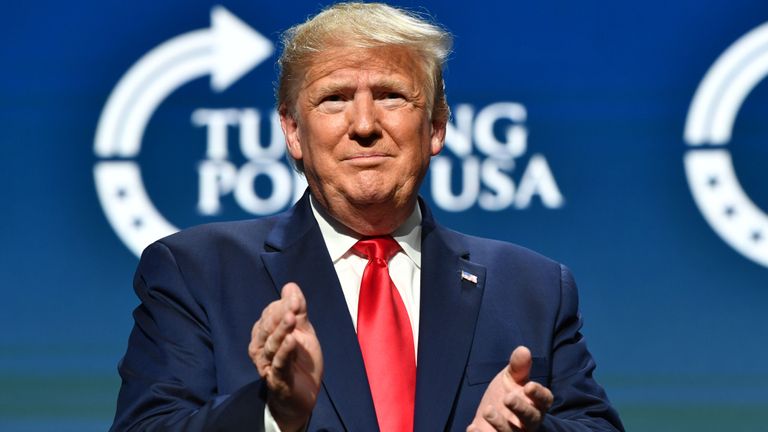Taliban commander warns no peace talks until all US troops leave Afghanistan
The insurgent group wants all foreign forces to leave the country before agreeing to any government negotiations or a ceasefire.
Monday 30 December 2019 17:32, UK
There can be no ceasefire and no talks with the US-backed Afghan government until all foreign forces leave Afghanistan, a mid-ranking Taliban commander has told Sky News.
The comments by Mawlavi Mansoor, who commands a group of fighters in an area to the southwest of Kabul, underline the potential challenge faced by Taliban leaders to ensure all insurgent foot soldiers implement the terms of any peace deal struck with the US.
The commander, who has no direct involvement in the US-Taliban peace talks, told Sky News he supported the push for peace but his desired conditions for laying down arms and talking directly with fellow Afghans on the other side of the war sounded unrealistic.
"A ceasefire is not possible at all because, while Americans are in our country, it is occupied. They must leave fully otherwise there is no chance of a ceasefire," he said, speaking in Pashto, flanked by his band of well-armed fighters.
"When the American leave then there will be talks between the Afghan factions. While Americans are present here no one will talk to their slaves."
Mawlavi Mansoor spoke with particular contempt for the government of President Ashraf Ghani in the exclusive interview last month in the Waghaz district of Ghazni province, central Afghanistan.
"The Taliban are not interested in talking to the Afghan government because they are like slaves - once you are done with the master [the Americans] then it will be easy to discuss with other [Afghans]," he added.
Donald Trump announced a resumption of peace talks with the Taliban during a trip to Afghanistan in November.
The US president had declared the talks to be dead back in September after months of negotiations appeared on the brink of a breakthrough.
Washington wants the Taliban to agree to a ceasefire and commit to ensuring Afghanistan will not again become a base for international terrorist groups like al Qaeda.
The next phase of the peace process would see the Taliban talk directly to Afghan officials.
In return, the US would withdraw the majority of some 12,000 military personnel out of the country. Other NATO-led forces would also draw down their troops, including British forces.
Mr Trump is keen to bring US forces home - such a move would likely offer him a boost going into the 2020 presidential election campaign.
However, US commanders want to maintain a presence on the ground to continue the fight against al Qaeda and a growing Islamic State presence. They could also help shore up support for the Afghan government as it began talks with the Taliban.
Britain may also look to maintain a longer-term military footprint in the country.
This is a sensitive area for the insurgent group, as they want all foreign forces out.
Mawlavi Mansoor said: "The Taliban will not accept the presence of American forces in here. Even if it's one American it will consider that to be occupied forces."
He continued: "Our conditions are: an Islamic system of the government, their full withdrawal and a joint Islamic system accepted by all. I am confident that we will reach a peace agreement. Because they [the Americans] don't have any other option but peace. If they don't agree to peace we will force them to leave, God willing."
The mid-ranking commander claimed the Taliban, which has regained control of more than 50% of the country from the US-backed Afghan security forces, is already acting as a de-facto government.
He said: "We have our own system of government functioning, we have governors, district governors, judges and all others. There is no need to form a new government."
The commander also alleged the Taliban - known for its oppressive treatment of women - accepted women's rights.
"Whatever rights have been given to the women in accordance to Islamic principles, we will give them all," he said.
Fawzia Koofi is a leading female politician in Afghanistan and a member of the Afghan parliament.
She took part in two rounds of separate talks between the Taliban and an Afghan delegation that had been running in parallel to the US-Taliban peace negotiations. They took place in Russia and Qatar, with a third round planned for China that did not materialise.
Ms Koofi said a ceasefire by the Taliban was crucial to build trust, followed by talks between the insurgent group and a full range of Afghan people - government ministers, women's rights groups, members of parliament and members of civil society.
"We have always been a very optimistic nation and I am hoping that the Taliban will actually listen to the people's demands," she said.
"They [the Taliban] agree on a ceasefire first - at least to demonstrate some level of trust - before we go to actual talks to agree on details of how it will look during the peace agreement and post-peace agreement.
"As a woman who has lived in this country for all my life and my daughters who have lived in this country, I want my daughters not to have the same life as I had. Many women in Afghanistan, many mothers will have the same desire as I do. Therefore we all wait for a positive outcome of all these US-Taliban talks."
The Taliban on Monday denied reports they had agreed a temporary ceasefire.
"In the past few days, some media have been releasing untrue reports about a ceasefire... The fact is that, the Islamic Emirate of Afghanistan has no ceasefire plans," it said in a statement reported by France's AFP news agency.
The Associated Press reported on Sunday that Taliban's ruling council had agreed to a temporary ceasefire though no date was given for when it would start or how long it would last.










